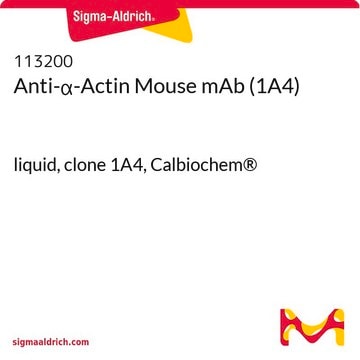MABT823
Anti-alpha-Actin Antibody, Cardiac Muscle Antibody, clone 22D3
clone 22D3, from mouse
Synonym(s):
Actin, alpha cardiac muscle 1, Alpha-cardiac actin
About This Item
Recommended Products
biological source
mouse
Quality Level
antibody form
purified immunoglobulin
antibody product type
primary antibodies
clone
22D3, monoclonal
species reactivity
rat, human, goat, rabbit
species reactivity (predicted by homology)
porcine (based on 100% sequence homology), mouse (based on 100% sequence homology)
technique(s)
flow cytometry: suitable
immunocytochemistry: suitable
immunofluorescence: suitable
western blot: suitable
isotype
IgG1κ
NCBI accession no.
UniProt accession no.
shipped in
ambient
target post-translational modification
unmodified
Gene Information
human ... ACTC1(70)
General description
Specificity
Immunogen
Application
Immunofluorescence Analysis: A representative lot immunostained cardiomyocytes in human left ventricular endocardial biopsies, rabbit left ventricular myocardium, as well as in goat atrial myocardium frozen tissue sections by fluorescent immunohistochemistry (Driesen, R.B., et al. (2009). J. Cell. Mol. Med. 13(5):896-908).
Western Blotting Analysis: A representative lot specifically detected alpha-cardiac actin in rat myocardium homogenate with no cross-reactivity toward - or -smooth muscle actin in rat aorta and chicken gizzard homogenates, cytoplasmic - or -actin in human platelet lysate, nor -skeletal actin in rat skeletal muscle homogenate (Driesen, R.B., et al. (2009). J. Cell. Mol. Med. 13(5):896-908).
Cell Structure
Quality
Flow Cytometry Analysis: 2 µL of this antibody detected alpha-cardiac actin in one million 4% paraformaldehyde-fixed, 0.2% Triton X-100-permeabilzed HeLa cells.
Target description
Physical form
Storage and Stability
Other Notes
Disclaimer
Not finding the right product?
Try our Product Selector Tool.
Storage Class Code
12 - Non Combustible Liquids
WGK
WGK 1
Flash Point(F)
Not applicable
Flash Point(C)
Not applicable
Certificates of Analysis (COA)
Search for Certificates of Analysis (COA) by entering the products Lot/Batch Number. Lot and Batch Numbers can be found on a product’s label following the words ‘Lot’ or ‘Batch’.
Already Own This Product?
Find documentation for the products that you have recently purchased in the Document Library.
Our team of scientists has experience in all areas of research including Life Science, Material Science, Chemical Synthesis, Chromatography, Analytical and many others.
Contact Technical Service








